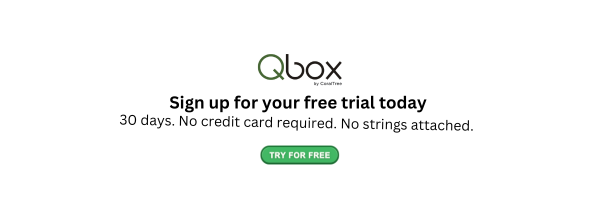In the accounting profession, precision and timing aren’t just important—they’re everything. Whether you’re balancing a client’s general ledger, reconciling bank accounts, or preparing tax filings, one delay can ripple into missed deadlines, frustrated clients, and compliance headaches.
This is where real-time collaboration reshapes the game. Accountants today are moving beyond outdated workflows like passing QuickBooks files back and forth through USBs or insecure email attachments. Instead, they’re embracing smarter, more efficient tools like Qbox, designed specifically for accountants and their clients.
In this blog, we’ll explore why Qbox has become the go-to solution for real-time collaboration in accounting, and how it helps firms of every size streamline workflows, reduce errors, and build client trust.
Why Collaboration is Critical in Accounting
Accounting isn’t a solo act. Even in firms with a single CPA, collaboration happens—between the accountant and their clients, bookkeepers, tax preparers, or auditors. Miscommunication or version control issues can easily throw off:
- Trial balances
- Reconciliation reports
- Cash flow statements
- Tax schedules
For example, if a bookkeeper updates accounts payable but the accountant is working on an outdated company file, the subsidiary ledger and control account balances won’t match. This results in wasted time and rework.
With real-time collaboration tools like Qbox, these bottlenecks are eliminated.
Qbox: Redefining Collaboration for Accountants
So, why do accountants choose Qbox over other tools?
1. Seamless QuickBooks File Sharing
Qbox is built with accountants in mind. It allows multiple users to work on the same QuickBooks Desktop company file without sending large attachments back and forth.
- You update the general ledger.
- Your client adds vendor bills.
- The file syncs automatically.
No overwrites. No duplicate copies. Just synchronized accuracy.
2. Version Control and File Locking
Ever tried reconciling an account, only to find that someone else made changes to the same file? Qbox solves this with file locking. When one user is editing, others can view the file in read-only mode. Once the lock is released, updates are synced seamlessly.
This ensures data integrity—vital when preparing adjusting journal entries (AJEs) or finalizing financial statements.
Qbox isn’t just about QuickBooks. It’s part of the Qbox Collaboration Suite, which includes:
- Client Portal – Securely share documents or invoices.
- E-signatures – Get client approval on engagement letters and agreements.
- Tasks and Workflows – Assign responsibilities, track deliverables, and meet deadlines.
- Team Chat – Keep communication centralized.
- Invoicing – Simplify client billing directly from the suite.
Accountants no longer need five different tools to manage client communication—they get it all in one platform.
Real-Time Collaboration in Action
Let’s make this interactive. Imagine this scenario:
- You’re a CPA preparing year-end adjustments for a small business.
- The client uploads updated payroll reports to Qbox’s client portal.
- Your bookkeeper simultaneously updates the accounts receivable subledger.
- You reconcile the bank statement while both processes are happening.
Instead of waiting on emails or worrying about who has the “latest version,” you and your team are collaborating in real time. This not only saves hours but also improves client satisfaction because the turnaround time is faster.
Benefits of Choosing Qbox for Accountants
1. Improved Efficiency
No more redundant data entry or chasing after clients for updated files. Every change syncs automatically, reducing rework.
2. Enhanced Security
Data breaches are a growing concern. With Qbox, files are encrypted, and access can be restricted.
3. Error Reduction
Version mismatches can lead to material misstatements in financial reports. Real-time collaboration ensures accountants are always working on the same trial balance.
4. Better Client Relationships
Clients appreciate transparency. With a portal to upload documents and communicate directly, Qbox fosters trust.
5. Scalable for Any Firm Size
From solo practitioners to large accounting firms, Qbox adapts. Solo accountants save time, while larger teams manage complex consolidation accounting and workflows.
Other collaboration tools exist, but Qbox stands apart because it is purpose-built for accountants. Unlike generic cloud storage platforms, Qbox understands the nuances of accounting:
- The importance of control accounts.
- The need for period-end closings without data mishaps.
- The security standards required for handling sensitive financial records.
Accountants aren’t just looking for a way to “share files.” They need a tool that aligns with the accounting cycle itself—and that’s what Qbox delivers.
Future of Collaboration in Accounting
The industry is shifting fast. With Client Advisory Services (CAS) on the rise, collaboration is no longer optional—it’s the backbone of modern accounting practices. Accountants who adopt real-time tools like Qbox stay competitive by:
- Offering faster turnaround.
- Providing more value-added insights.
- Building stronger, ongoing relationships with clients.
As firms pivot from compliance-focused services to advisory roles, real-time collaboration will be the difference between firms that thrive and those that fall behind.
Conclusion: Collaboration That Works for Accountants
Real-time collaboration is no longer a “nice-to-have”—it’s a necessity. With features designed for accountants, from QuickBooks file sharing to secure client portals, Qbox empowers firms to work smarter, not harder.
When deadlines are tight and accuracy is paramount, accountants choose Qbox because it eliminates the friction of traditional file-sharing and ushers in a future where collaboration is seamless, secure, and efficient.
If you’re ready to elevate your accounting practice, it’s time to experience the power of real-time collaboration with Qbox.

-2.png?width=1400&height=768&name=Add%20a%20heading%20(21)-2.png)
-2.png?width=1400&height=768&name=Add%20a%20heading%20(21)-2.png)